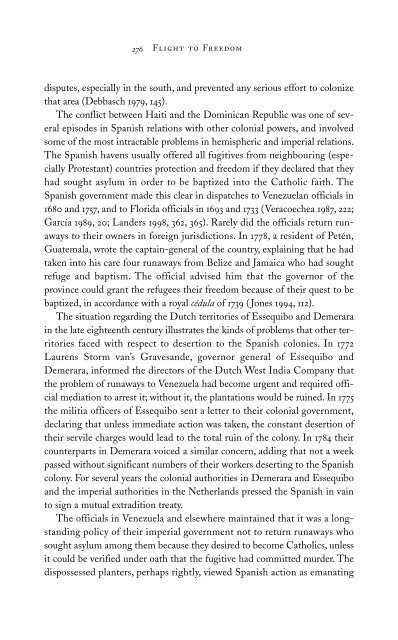60199616-flight-to-freedom-african-runaways-and-maroons-in-the-americas
60199616-flight-to-freedom-african-runaways-and-maroons-in-the-americas
60199616-flight-to-freedom-african-runaways-and-maroons-in-the-americas
Create successful ePaper yourself
Turn your PDF publications into a flip-book with our unique Google optimized e-Paper software.
276 Flight <strong>to</strong> Freedom<br />
disputes, especially <strong>in</strong> <strong>the</strong> south, <strong>and</strong> prevented any serious effort <strong>to</strong> colonize<br />
that area (Debbasch 1979, 145).<br />
The conflict between Haiti <strong>and</strong> <strong>the</strong> Dom<strong>in</strong>ican Republic was one of several<br />
episodes <strong>in</strong> Spanish relations with o<strong>the</strong>r colonial powers, <strong>and</strong> <strong>in</strong>volved<br />
some of <strong>the</strong> most <strong>in</strong>tractable problems <strong>in</strong> hemispheric <strong>and</strong> imperial relations.<br />
The Spanish havens usually offered all fugitives from neighbour<strong>in</strong>g (especially<br />
Protestant) countries protection <strong>and</strong> <strong>freedom</strong> if <strong>the</strong>y declared that <strong>the</strong>y<br />
had sought asylum <strong>in</strong> order <strong>to</strong> be baptized <strong>in</strong><strong>to</strong> <strong>the</strong> Catholic faith. The<br />
Spanish government made this clear <strong>in</strong> dispatches <strong>to</strong> Venezuelan officials <strong>in</strong><br />
1680 <strong>and</strong> 1757, <strong>and</strong> <strong>to</strong> Florida officials <strong>in</strong> 1693 <strong>and</strong> 1733 (Veracoechea 1987, 222;<br />
García 1989, 20; L<strong>and</strong>ers 1998, 362, 365). Rarely did <strong>the</strong> officials return <strong>runaways</strong><br />
<strong>to</strong> <strong>the</strong>ir owners <strong>in</strong> foreign jurisdictions. In 1778, a resident of Petén,<br />
Guatemala, wrote <strong>the</strong> capta<strong>in</strong>-general of <strong>the</strong> country, expla<strong>in</strong><strong>in</strong>g that he had<br />
taken <strong>in</strong><strong>to</strong> his care four <strong>runaways</strong> from Belize <strong>and</strong> Jamaica who had sought<br />
refuge <strong>and</strong> baptism. The official advised him that <strong>the</strong> governor of <strong>the</strong><br />
prov<strong>in</strong>ce could grant <strong>the</strong> refugees <strong>the</strong>ir <strong>freedom</strong> because of <strong>the</strong>ir quest <strong>to</strong> be<br />
baptized, <strong>in</strong> accordance with a royal cédula of 1739 ( Jones 1994, 112).<br />
The situation regard<strong>in</strong>g <strong>the</strong> Dutch terri<strong>to</strong>ries of Essequibo <strong>and</strong> Demerara<br />
<strong>in</strong> <strong>the</strong> late eighteenth century illustrates <strong>the</strong> k<strong>in</strong>ds of problems that o<strong>the</strong>r terri<strong>to</strong>ries<br />
faced with respect <strong>to</strong> desertion <strong>to</strong> <strong>the</strong> Spanish colonies. In 1772<br />
Laurens S<strong>to</strong>rm van’s Graves<strong>and</strong>e, governor general of Essequibo <strong>and</strong><br />
Demerara, <strong>in</strong>formed <strong>the</strong> direc<strong>to</strong>rs of <strong>the</strong> Dutch West India Company that<br />
<strong>the</strong> problem of <strong>runaways</strong> <strong>to</strong> Venezuela had become urgent <strong>and</strong> required official<br />
mediation <strong>to</strong> arrest it; without it, <strong>the</strong> plantations would be ru<strong>in</strong>ed. In 1775<br />
<strong>the</strong> militia officers of Essequibo sent a letter <strong>to</strong> <strong>the</strong>ir colonial government,<br />
declar<strong>in</strong>g that unless immediate action was taken, <strong>the</strong> constant desertion of<br />
<strong>the</strong>ir servile charges would lead <strong>to</strong> <strong>the</strong> <strong>to</strong>tal ru<strong>in</strong> of <strong>the</strong> colony. In 1784 <strong>the</strong>ir<br />
counterparts <strong>in</strong> Demerara voiced a similar concern, add<strong>in</strong>g that not a week<br />
passed without significant numbers of <strong>the</strong>ir workers desert<strong>in</strong>g <strong>to</strong> <strong>the</strong> Spanish<br />
colony. For several years <strong>the</strong> colonial authorities <strong>in</strong> Demerara <strong>and</strong> Essequibo<br />
<strong>and</strong> <strong>the</strong> imperial authorities <strong>in</strong> <strong>the</strong> Ne<strong>the</strong>rl<strong>and</strong>s pressed <strong>the</strong> Spanish <strong>in</strong> va<strong>in</strong><br />
<strong>to</strong> sign a mutual extradition treaty.<br />
The officials <strong>in</strong> Venezuela <strong>and</strong> elsewhere ma<strong>in</strong>ta<strong>in</strong>ed that it was a longst<strong>and</strong><strong>in</strong>g<br />
policy of <strong>the</strong>ir imperial government not <strong>to</strong> return <strong>runaways</strong> who<br />
sought asylum among <strong>the</strong>m because <strong>the</strong>y desired <strong>to</strong> become Catholics, unless<br />
it could be verified under oath that <strong>the</strong> fugitive had committed murder. The<br />
dispossessed planters, perhaps rightly, viewed Spanish action as emanat<strong>in</strong>g


